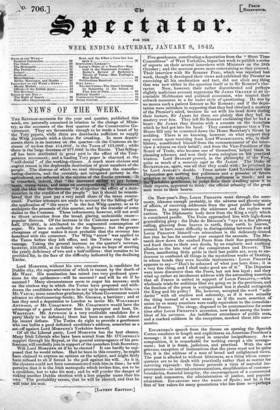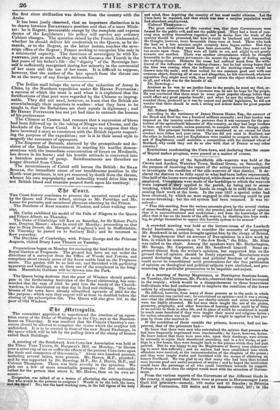ESPARTERO'S speech from the throne on opening the Spanish Cortes
emulates in length and explicitness an American President's message : it is not at all royal in oracular insignificancy. As a composition, it is remarkable for *nothing except a vile arrangement; but it is frank, judicious, and practical. With the one grievous exception of insinuations that the press must not be quite free, it is the address of a man of broad and enlightened views. The past is alluded to without bitterness, as a thing whose consequences are to be dealt with practically rather than as matter for surviving reproach : the future presents a vista of material improvements—in internal communications, simplification of customsboundaries, financial integrity, the encouragement of a commercial navy and commerce, the administration of justice, and popular education. ESPARTERO sees the wants of Spain ; and he .is the first of her rulers for many generations who has done so—perhaps the first since civilization was driven from the country with the Arabs.
It has been justly observed, that an important distinction is to be drawn between ESPABTEEO'S position and that of a mere Minister : he is Regent, irremovable except by the complete and express decree of the Legislature ; his policy will survive any ordinary Cabinet changes. The question raised by the French Ambassador, whether he should deliver his credentials to the Queen, as he demands, or to the Regent, as the latter insists, touches the sovereign office of the Regent ; France seeking to recognize him only in a ministerial capacity. The functions of sovereignty lie with EsPARTERO, just as much as they lay with GEORGE the Fourth in the last years of his father's life : the " dignity " of the Sovereign herself is sufficiently recognized during her minority in the ceremonial of her state and the use of her name. It is difficult to suppose, however, that the author of the late speech from the throne can be at the mercy of any foreign ambassador.



























